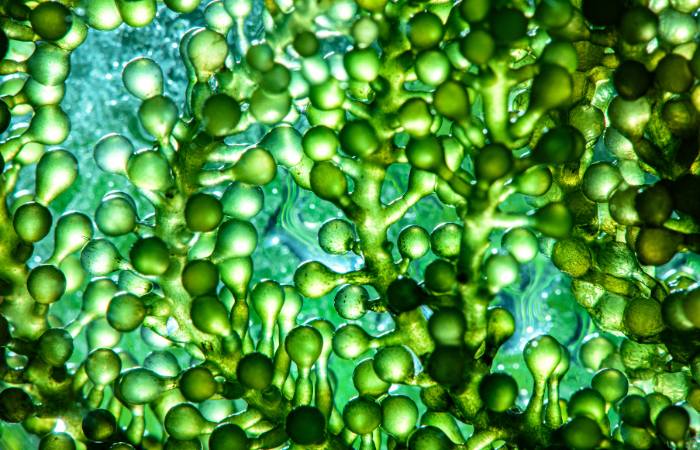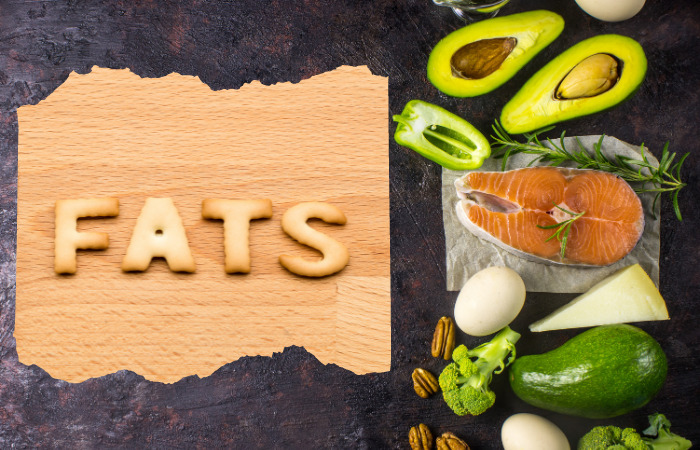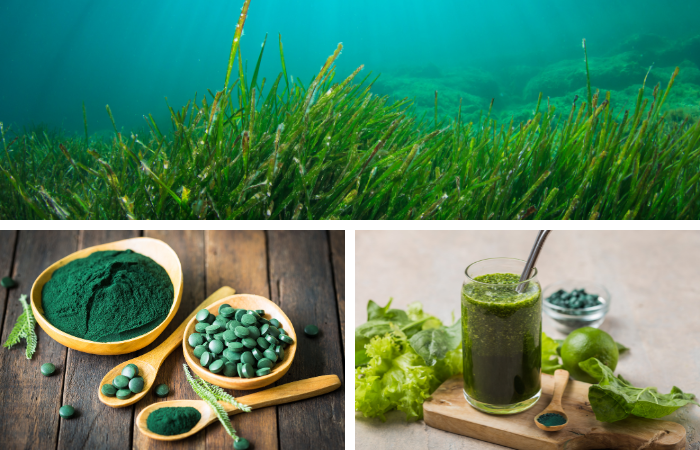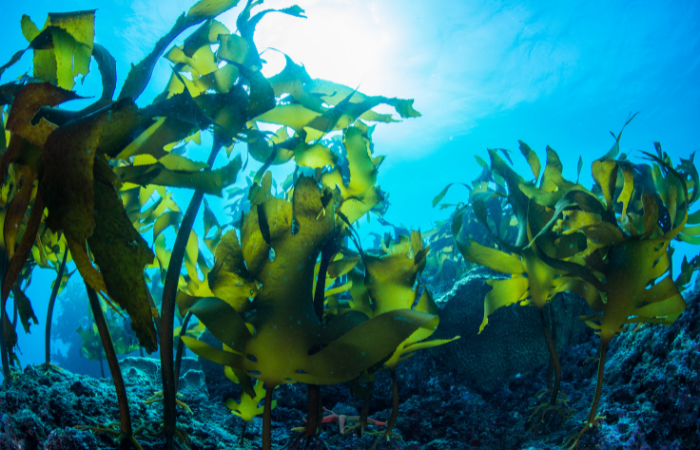
To start, I think it’s fair to say that nine times out of ten, when you hear about omega-3 fatty acids, it’s in the same sentence as fish and/or fish oil. Now, did you know that fish don’t actually produce omega-3 fatty acids? In fact, fish along with humans and animals, are unable to make it.
Disclaimer: This post contains affiliate links. If you use these links to make a purchase, I will earn a small commission at no additional cost to you. Read this Affiliate Disclosure for more information. Thank you.
Small prey fish and crustaceans feed on microalgae and are then eaten by larger fish and so on. As a result, the omega-3 fats EPA and DHA store in their tissues. Microalgae are the main food source of essentially all marine and freshwater food chains. Thus, fish are the middlemen for this nutrient. This information, like a lot of information, is not commonly known or talked about in the mainstream.
In need of a quality supplement? Pure Hemp Botanicals is quite passionate about hemp, and it shows in their products. They offer some of the highest quality supplements I have come across. Ticking all the boxes of qualities I personally look for; third-party testing results, plant-based, vegan, cruelty-free, non-GMO, sustainable, and gluten-free. Their products include ingredients like: Hemp (highly nutritious), CBD (often used for pain relief and relaxation), CBN (often used for sleep and pain relief), so there’s something for everyone! (None of those are psychoactive btw) Pure Hemp Botanicals has a large variety of wellness products for you and even your pets! 30% off site-wide now!
Fats in a Nutshell

Omega-3 fatty acids are one of those healthy fats that belong to the category of unsaturated fats, which include polyunsaturated and monounsaturated fats. They remain liquid at room temperature. Omega-3 fatty acids are vital to your health and survival. On the other hand, saturated fats are the ones you need to watch your intake of and can damage your health. Saturated fats come from animal foods.
Meanwhile, polyunsaturated fats are those ‘essential’ fats you hear about. The ones your body doesn’t make and you need to get from your diet. Omega-3 and omega-6 fatty acids make up this group. Excessive amounts of processed omega-6 fatty acids can contribute to inflammation, increase cholesterol, and other harmful symptoms.
For the most part, people over-consume this fat, as it’s found abundantly in vegetable oils, such as canola, safflower, corn, and soybean oils. So, you probably don’t need to worry too much about whether you’re consuming enough. Simply, aim to consume omega-6 fats in their whole-food, unprocessed form.
Whereas, omega-3s are not as easy to get in your diet. This fat includes; EPA, DHA and ALA. A small amount of ALA, a short-chain fatty acid, converts into EPA, then further into DHA. However, it may not be sufficient enough to sustain the appropriate levels you need. Therefore, consuming EPA and DHA, which are long-chain fatty acids, is the better way to get your omega-3s.
Finally, omega-9s reside in the monounsaturated category. Our bodies produce these guys so you don’t have to supplement them, unless for specific health reasons. Therefore, they are known as non-essential fatty acids. And are found in foods such as olives, olive oil, almonds, avocados, and more. The body utilizes omega-9s when omega-3&6 are not present.
Best Plant-Based Sources of Omega-3 Fatty Acids

First, there’s a variety of choices for those on a plant-based diet to get their intake of omega-3 fatty acids. Although, most do come from the sea as macro and microalgae. In fact, many of these are great sources of iodine too, read more about that here. They are all healthy, with a lengthy nutritional profile, and fairly versatile to use in cooking. You can buy them as the whole-foods or in supplement form. However, if you decide to purchase the supplement, do some research on it. Ensure it is high-quality, clean, sustainable, and tested thoroughly for impurities. Normally, you can easily find all this information readily on the supplements website.
Here I list a few types of algae with both EPA and DHA. Pay attention to the amount of EPA and DHA in the following algae as they can vary. Such as between different seaweed (there are thousands of seaweed varieties). Seaweed is quite nutrient-dense too, offering a hefty amount of vitamins and minerals.
- Various Seaweed (red, green, and brown)- such as Wakame, Kombu, Dulse, or Nori- Can use these in soups, dried as a snack, ect.
- Spirulina- Sold in powder or capsule form. In powder form, you can add to smoothies and juices.
- Chlorella- Same as spirulina ^^
- Algae Oil Supplements- There are lots on the market to choose from.

Omega-3 as ALA
There are some healthy fats included in other sources of plant-based foods which are good for you. Although, this list includes foods with ALA present, which later converts to EPA than DHA. As we talked about earlier, it may not convert into high enough amounts. Personally, I do not rely on ALA for my intake of omega-3s. Some argue this subject in the plant-based community, so I will leave it at that 😉 Nonetheless, these are whole foods that are great for you in various ways!
- Leafy greens
- Nuts- Walnuts, Pine Nuts, Pecans, Pistachio, Macadamia
- Avocado
- (Organic) Soybeans, Tempeh, Tofu
- Seeds- Hemp, Flax, Pumpkin, Chia
- Olives
- Edamame
Health Benefits of Omega-3 Fatty Acids

Generally, most organizations recommend a minimum of 250 to 500 mg DHA and EPA, combined per day, for healthy adults. This is the minimal amount you need for survival. It seems to be agreed upon not to exceed the dose of 5,000mg per day. In some cases, higher amounts are advised for certain health conditions.
Furthermore, omega-3 and 6 are advised to take in particular ratios, such as 4:1, 2:1, or 1:1 (with omega-6 as the left, higher number). Clearly, the optimal ratio is not defined and varies considerably. And so, it is unclear what the proper ratio number is. Ultimately, it is fair to say to minimize your intake of processed omega-6’s, like in ultra-processed refined vegetable oils, when possible. Sadly, the typical Western diet contains around 10 times more omega-6s than omega-3s!
Your body uses omega fatty acids for many important functions!
- Healthy brain function and protection
- Healthy skin and eyes
- Stronger immune system
- Cardiovascular health
- Supports the body’s production of HDL cholesterol- the ‘good’ cholesterol
- Helps keep our arteries clear
- Provides us energy
- Helps to lower blood pressure
- Can reduce symptoms of depression and anxiety
- Reduces inflammation in the body
- Contributes to the development of the brain and eyes in fetuses and breast-fed babies
- Beneficial for autoimmune disorders
- The list goes on and on…
To Conclude
In the end, I hope this sheds light on a another side of omega-3s that you don’t often hear about. Alternatives to fish and fish oil exist. Vegetarians and vegans have options to get this crucial fat into their diets. As with anything, do your own research on the foods and supplements you incorporate into your diet. Ensure you are getting the best-quality and sufficient amounts!
Latest Posts
- What Grief Has Taught Me
- Unique Gift Ideas For The Spiritual Person In Your Life
- Healthy Chocolate Pudding Recipe
- My Weird Everyday Health Habits
- 6 Easy Ways To Enter The Present Moment
Sources:
https://ods.od.nih.gov/factsheets/Omega3FattyAcids-HealthProfessional/
https://www.ncbi.nlm.nih.gov/pmc/articles/PMC3465194/
https://lpi.oregonstate.edu/mic/other-nutrients/essential-fatty-acids#introduction
https://www.sciencedirect.com/science/article/abs/pii/S0952327818300747
https://www.healthline.com/health/food-nutrition/saturated-and-unsaturated-fat#recommended-levels
https://pubmed.ncbi.nlm.nih.gov/31698772/
https://www.ncbi.nlm.nih.gov/pmc/articles/PMC8124752/
https://www.healthline.com/nutrition/how-much-omega-3#bottom-line
https://ift.onlinelibrary.wiley.com/doi/full/10.1111/1541-4337.12396






There’s some really good organic options in here! I’m surprised! If I learn anything in g from nutrition class, it’s that fatty acids are essential to our every health. Thanks so much for sharing!
I’ve always heard about the health benefits of Omega 3 fatty acids, and knew that fish contained them – but had no idea it wasn’t made by them. Nice to know snacks like seaweed also contain them when you aren’t feeling like eating fish.
“Thank you for this informative post on plant-based sources of omega-3 fatty acids. As someone who follows a plant-based diet, it’s great to know the various options available to incorporate these essential nutrients into my meals. Your article has provided valuable insights and will definitely help me make healthier choices. Keep up the great work!”
I didn’t know that there are so much sources of omega 3 fatty acids
Your article on plant-based sources of omega-3 fatty acids is an invaluable resource for those following a plant-based diet or looking to incorporate more omega-3s into their meals. The list you provide showcases a variety of nutrient-rich plant-based foods that are abundant in omega-3 fatty acids. From chia seeds and flaxseeds to walnuts and hemp seeds, you offer a diverse range of options to suit different tastes and dietary preferences. Your informative descriptions and tips on incorporating these foods into everyday meals make it easier for readers to make informed choices for their health. Thank you for sharing such valuable information and helping us discover plant-based sources of omega-3 fatty acids.
I didn’t know that fish don’t actually produce Omega 3! I guess that’s why we need to take supplements!
didn’t know about the ALA conversion to the EPA/DHA aspects of omega-3..While we do consume a lot of the plants that you mention under the ALA list, I now realize it might not be enough, so maybe having the fish oil tablets might be the way to go, or spirulina supplements. Thanks for this info
These are some wonderful ways of getting plant-based omega 3!
This is all really interesting to know. I honestly didn’t know a lot about omega 3 at all. I use to take it in pill form, but never knew some of these interesting facts.
While I don’t follow a plant-only diet, I am trying to include more plants so I really appreciate this info, especially because I hate the fish-based pills. I love my seaweed wrap snacks and if that’s giving me some Omega-3, I just got a bonus!!! I will also look to add the other options and drop the yucky processed pills.
Omega 3s are something I’m trying to make sure my family gets more of. We’ve been eating more fish and avocados so that’s a good start for us.
I absoltuely love edamame and olives. So many great ideas here
So many Omega 3 sources that are new for me! I need to include them in my daily diet!
I love that there’s a better way to get omega 3 fatty acids without having to rely on fish oils as supplements!
I love eating avocados. They are great for helping increase your good cholesterol too.
Need to include these omega 3 sources in my daily diet 👍🏻
I didn’t know about some of these Omega 3 sources this is so informative thanks for sharing this with us